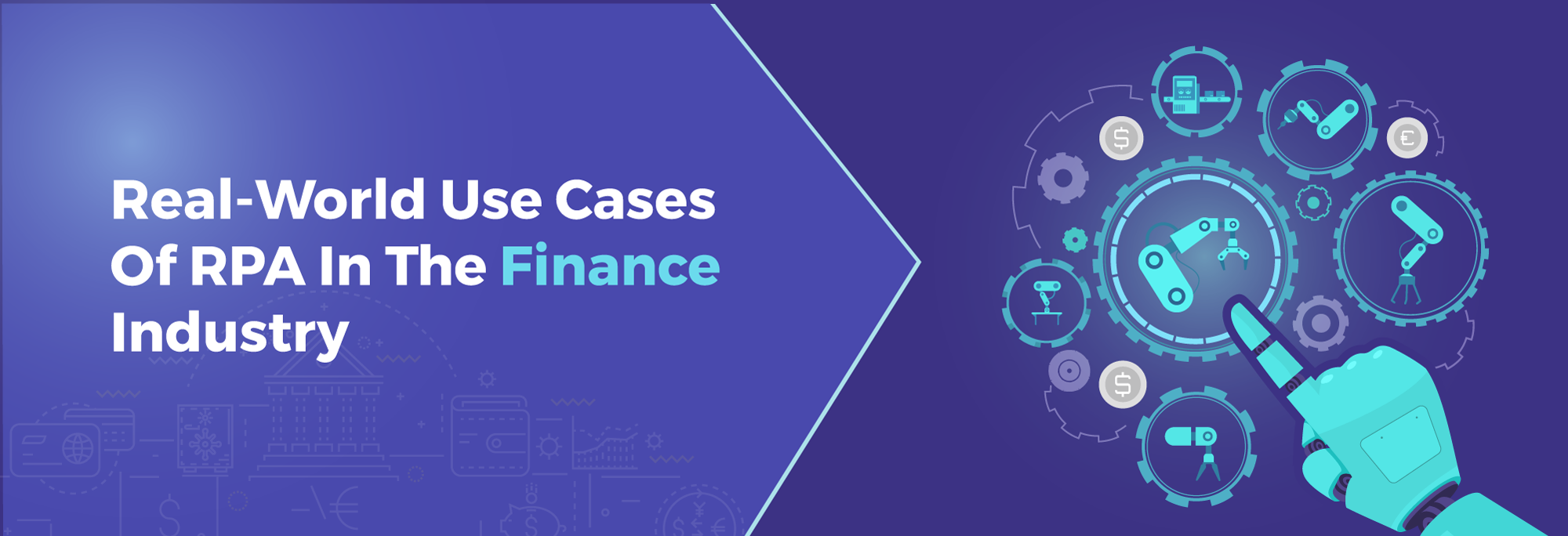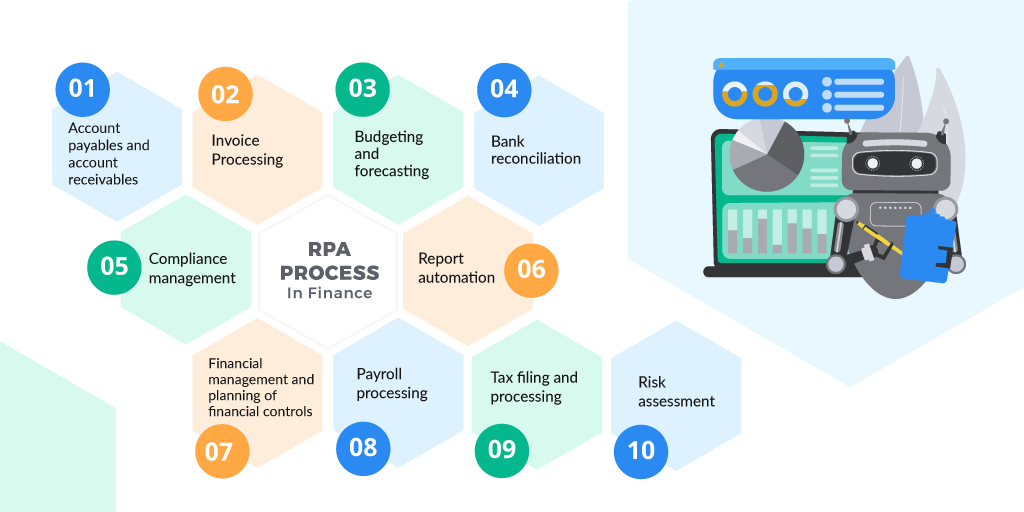
According to the Gartner report, about 80% of finance leaders have implemented RPA or planning to implement RPA.
As per another Gartner reports, “90% of corporate controllers will soon be using RPA in financial and management reports, accounting closes, technical accounting and cost-related activities.”
The finance industry keeps on improving with every passing day. RPA has a key role in the development and advancement of the finance sector. The finance industry is more about unflagging accuracy, where RPA can be a perfect suit to ensure the end to end accuracy. If we keep an eye on the development of the last decade, we will see how RPA has caused traction in the finance domain. RPA solutions don’t get tired with a sudden workload or in case of an emergency.
Read this blog to know more about the increasing role of RPA in the finance sector. This blog will list down the possible real-world used cases of RPA in the finance industry.
What processes RPA is automating in the finance industry?

RPA-led automation journey has forced the finance industry to be equipped with the attaining objectives. With RPA, the finance industry keeps on exploring solid grounds through process automation.
A McKinsey report confirms that RPA has 43% automation potential for finance and accounting.
Genpact foresees up to a 50% increase in the productivity of companies that follow the automation trend.
Now let’s explore some real-world use cases of RPA in the finance industry.
- Account payables and account receivables
- Invoice processing
- Budgeting and forecasting
- Bank reconciliation
- Compliance management
- Report automation
- Financial management and planning of financial controls
- Payroll processing
- Tax filing and processing
- Risk assessment
1. Account payables and account receivables
Uipath forecasted an automation rate of 80% for common processes like accounts receivable or accounts payable.
Automating account payables and receivables through RPA prevents efforts in complex and tedious tasks that require a great amount of time and data entry skills to process the payment records. RPA automates the whole process, reduces the complexity and processing time.
In the accounts department, validation and reconciliation hold significant importance. Contrariwise, in manual processing, the chances of errors are high, which can lead to inadequate record-keeping of invoices and payments to the ERP. RPA solutions digest invoice data in different formats and process the data at the same speed with the least chance of errors.
2. Invoice processing
Invoice processing is an integral and repetitive task in the financing sector. In this process, RPA is doing great to accelerate invoice processing with better accuracy.
RPA ensures the accuracy of data entry for invoice processing by fetching data from concerned resources. Automation in this process reduces labor costs and improves processing time by 80%.
3. Budgeting and forecasting
In budgeting and forecasting, collecting data, data analysis, making reports, reports analysis, and a lot more time-consuming tasks involved. RPA is the best suit to deal with all these parameters without compromising accuracy and time.
Gartner reports predict that human error within the finance function produces on average, 25,000 hours of avoidable rework at a cost of $878,000 per year.
With the help of RPA, the cost of rework can be prevented and the profit ratio of the companies can be improved. As a result, it reduced the significant amount of analysis processing time and cost.
4. Bank reconciliation
Automating this process with RPA is a lifesaver by matching payment details with bank records. The process of data extraction and data comparison becomes easier with the help of RPA. It reduces the processing time to know the information about the money spent and money received. RPA is very helpful in accelerating the process and removing the exception in the transaction processes.
Checking and managing the transactions manually can prove to be a daunting and time-consuming task. Moreover, this process is tedious and repetitive, which can slowly affect the productivity of the employees in the long run. Furthermore, RPA bots can generate reports on the bank reconciliation process and provide quick insights and improvement areas. Which can ultimately help banks and businesses take reform decisions.
5. Compliance management
Data security in adherence to laws and regulations is mandatory for any business. Keeping up with the latest regulatory laws becomes difficult sometimes to manage regulatory compliance.
RPA can be very helpful in monitoring compliance with regulatory requirements, including KYC (know your customer) and AML (anti-money laundering) regulations. It helps in collecting, analyzing data, and flagging suspicious transactions.
Automating this process through RPA will reduce the need to continuously verify compliance requirements, manage third-party risks, and catch potential weaknesses manually. With automation, inadequacies, and inaccuracies in compliance, workflows, and reporting can be minimized, reducing the likelihood of fines and other penalties.
6. Report Automation
The process of report generation demands the extraction of data from different resources, a compilation of the relevant data, and an analysis of the data. The whole process takes companies’ precious time. By automating this process, data from various sources can be consolidated and automatically populated into refined forms, eliminating the need for manual data entry and reducing the risk of errors in the final report generation.
Report automation through RPA will help save time and make reports with deep analysis, ensuring error-free report generation.
7. Financial management and planning of financial controls
Financial management list down a lot of tasks where active knowledge of industry trends is mandatory to finalize the tasks. For unprecedented visibility across the workforce, it is imperative to analyze the latest financial trends. As for the variance reports, RPA does exactly the same by automating data inputs, data formatting, and reporting to all stakeholders.
The application of RPA has improved the financial management and financial forecasting process for various companies. RPA provides forecasts at a faster cycle time and helps companies in financial planning by maintaining updates on the latest capital expenditures, investments, and financial statements.
8. Payroll processing
Processing payroll is a time-consuming and complex task that might face delays due to manual processing. RPA bot makes this process smooth, streamlined, and efficient.
This process usually involves extracting, and entering data, validating timesheets, verifying employee information, scheduling payments, and calculating payouts. Automating payroll management with RPA ensures 100% accuracy by extracting data from a variety of sources and calculating payments.
9. Tax filing and processing
The accounting and finance industry can use RPA services to automate the processes of tax calculations and compliance by gathering data, preparing reports, establishing tax bases, and submitting tax returns.
Intelligent automation bots can quickly manage all the tasks involved in the processing of tax filing. The bots can independently perform tasks like interpreting data, making decisions, taking action, and a lot more. Moreover, now automation software is easily available that replaces the manual time-consuming process with far better productivity and accuracy.
One of the most important factors for tax compliance and reporting is data management. Large volumes of data need to be gathered and analyzed. Legacy tax compliance systems had data gathering processes that extracted data from transactions that had already taken place. This data provides valuable insights into the tax departments. However, the tax departments also need foresight or data that convey what lies ahead.
10.Risk assessment
Robots are playing a crucial role in rules-based risk assessment—an essential effort for lessening the strain organizations place on audit professionals. When potential risk violations arise because of specific transactions or changes in the company’s financial vitals, the RPA robots immediately send an alert notification for attention and prevent the risks in processes. Robots quickly identify anomalies and fraudulent activities. Moreover, bots will dramatically help in detecting violations and catching errors.
Final remarks
The remarkable result rendered by RPA in the finance industry has offered competitive advantages to companies and enabled them to automate their processes without relying on human force.
RPA has contributed well in overcoming workflow bottlenecks, reducing possible human errors, and getting started with AI, ML-enabled robotic process automation in finance and accounting. With the implementation of robotic process automation, the finance industry can enjoy a notable change in various processes. BITLogix will help you gain your objectives with the help of RPA solutions. Our expert RPA team will boost your process optimization with the best RPA practices. Contact us to bring automation to your business.